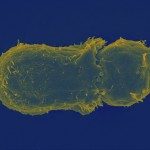Lien vers Pubmed [PMID] – 8782349
Vaccine 1996 Apr;14(6):511-20
We have shown in a previous study that the proliferative CD4+ T-cell response to the regulatory immediate-early protein IE1 was a major component of the overall anti viral response in human cytomegalovirus (HCMV) seropositive blood donors. This viral antigen may be valuable in subunit vaccine design, since anti IE1 CD4+ T cells might provide help for production of antibodies and cytotoxic T lymphocytes (CTL) responses, and could take part in the control of viral infection. Preliminary to the elaboration of future vaccine formulations, we developed immunogenic complexes resulting from the combination of a purified recombinant protein derived from the fusion of Escherichia coli glutathione-S-transferase (GST) and a large C-terminal fragment (e4) of IE1, with new 80 nm cationic synthetic particles called Biovectors. We have shown that the antigen GST-e4 was stably complexed to vectors and that, contrary to the soluble form, it was protected from proteolysis in cell culture medium. By confocal microscopy we observed that the synthetic vectors were internalized by lymphoblastoid B cells, providing a significant enhancement of antigen delivery in antigen presenting cells (APC). Indeed, we demonstrated that the previous combination of antigen with particles, significantly enhanced the proliferation of specific CD4+ T-cell clones directed against IE1 in vitro, when either HLA-matched isolated peripheral blood mononuclear cells or EBV transformed B cell lines were used as APC. The relevance of these observations to the use of these new vectors for vaccine design against HCMV is discussed.

